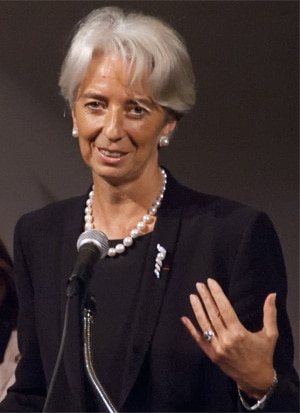MILESTONES: IMF/WORLD BANK
By Laurence Neville
A year on from the appointment of Christine Lagarde as managing director of the International Monetary Fund (IMF), the challenges faced by her institution—and its sister entity, the World Bank—in helping to right the global economy are undiminished.
 |
|
The global economic outlook is more precarious than ever, as Lagarde hits her one-year anniversary as head of the IMF |
| Photo Credits: ALBERT H. TEICH/ Shutterstock.com |
Indeed, the outlook is more precarious than it was a year ago because of the eurozone’s continued failure to solve its debt crises.
As the IMF and World Bank hold their annual meetings in Tokyo in October, questions about the track record of the two pillars that are designed to support global economic and financial order are louder than ever. Most notably, the resignation in July of Peter Doyle, former adviser to the IMF’s European Department, which is in charge of the bailouts of Greece, Portugal and Ireland, has highlighted significant problems.
Doyle’s parting accusations were that the IMF—which focuses on management of the global economy, in contrast to the World Bank, which is concerned with economic development—failed to warn about the scale of the problems facing many economies. Moreover, what warning it did give was too late. These were not shock revelations: The IMF itself had already published reports identifying such failings.
However, two of Doyle’s other claims are more damaging. The first is that the fund has been “playing catch-up” ever since it failed to warn of the disastrous buildup of pressures in the global economy. The second is that the appointment of senior IMF staff is illegitimate and reinforces a “European bias” that undermines the credibility and work of the fund.
Both criticisms have considerable merit. Certainly, there is little evidence that the IMF has struck a bold new course in the past year. Instead, it has continued to follow the lead of the EU in working to solve the debt crisis that has engulfed its periphery and is now spreading to its core (in July, Moody’s cut its outlook for Germany’s Aaa credit rating from stable to negative).
Should it matter that the IMF is following the lead of Europe’s legitimate government institutions? Ordinarily, there would be a strong argument for applauding the IMF’s willingness to support rather than lead the region’s democratic actors, given its past reputation for high-handedness (as in Latin America in the 1980s or Asia in the 1990s).
However, the EU is infamously dysfunctional. Given the need for 27 member states to compromise, it suffers a leadership vacuum. It needs a clear route out of the crisis-reaction loop that has dominated decision-making in the past 18 months—not just money and warm words.
This leadership failure is closely related to the second criticism: that the IMF is eurocentric (and treats European countries more leniently than developing countries). To be sure, Lagarde’s appointment was an unpleasant reminder of the stranglehold Europe has on IMF leadership roles. However, there are signs that Lagarde is seeking to broaden the IMF’s worldview.
At the end of July, Lagarde gave a speech hosted by the Bank of Thailand in which she said the IMF must listen to Asian opinions more. Most important, considering continued Asian resentment of IMF actions during the Asia crisis of 1997, she said that the IMF will “revise the textbook of crisis resolution depending on country specifics and on regional ties.”
Meanwhile, in August the IMF warned Botswana about the importance of addressing deprivation within the country. For many it was a revelation: The IMF was seen to have played a role that was not simply about advancing the interests of multinationals and global financial institutions.
Of course, these two small advances do nothing to meet the criticism that the IMF is Europe-dominated. Surely, its next leader should be from elsewhere—perhaps Asia or Africa?—if it is to retain credibility. However, they do indicate that fresh thinking is occurring. Given the state of the global economy and the pressing need to find effective solutions, the tack can only be welcomed.



